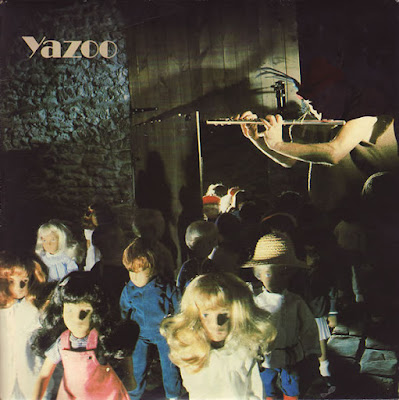
Eight weeks at number one from 24th July 1982
When we bumped into Yazoo’s last single “Only You”, there was a sense the new duo were just settling into their working relationship. For whatever its strengths and commerciality, “Only You” was a track Vince Clarke had lying around before Yazoo came into being, and had initially considered hawking around to other groups. At the point of writing it, his working relationship with Alison Moyet hadn’t really been instigated, so what the public were left to buy was Moyet interpreting a track which at one point could just as easily have been handed to Depeche Mode.
“Don’t Go” is the first example of a Yazoo single where the fork in the road, the divergence between Mode and Clarke, is obvious. If Clarke’s earliest work with Depeche Mode fizzes and bops, “Don’t Go” bops and slams. The drum machine is approximating an R&B/gospel rhythm, the central synth riff – in all other respects close enough to something Clarke might have tried circa “Just Can’t Get Enough” – has more dancefloor friendly shades to it, not least the aspects where the familar high-end squeakiness is replaced by digital bubbling or low, bassy grumbles.
It’s actually less ambitious melodically than a lot of Depeche Mode’s earliest work. “New Life” was busy and surprisingly ambitious, always introducing new twists, while “Don’t Go” finds its groove by the twentieth second and sticks rigidily to it, only offering slight variations.
Unlike “New Life”, though, Clarke has a singer who can be ambitious on his behalf. While Dave Gahan is a strong vocalist, his performances from 1981 right through to the present day have tended to stick doggedly to a mournful mid-range. You could argue that it forced Depeche Mode to become more dramatic, more symphonic around him; his vocals have generally acted as the central anchor, requiring the splashes of colour to occur elsewhere in the songs. Moyet, on the other hand, veers from threatening low growls here right up to desperate shrieks. She supplies the dramatic flourishes while Clarke is free, for the first time, to let the central hooks hit a steady dancefloor friendly groove without worrying too much about frilly embellishments.
With it, the pair also managed to take early eighties synth pop to slightly different places from their peers. If you were being charitable, you could argue that it was fresh and new, and that it signalled that Clarke knew synths were about more than just aloofness and futurism, but in truth they weren’t the first to realise this. Giorgio Moroder picked up the new technology and discovered that it could represent sex, desire, vulnerability and danceability in the previous decade. All Clarke and Moyet were really doing was picking up the baton and understanding that they didn’t need permission to take electronics into these areas. Their approach here, a kind of gospel tinged New Romanticism, did however slowly nose away at the boundaries of what was possible, impressing critics without frightening either the school disco dancefloor or Clarke’s earliest fans.
“Don’t Go” is one of those rare examples of two stylistically very different individuals realising the qualities they have in tandem, and working them through with maximum effectiveness. It peaked at number 3 in the national charts.
